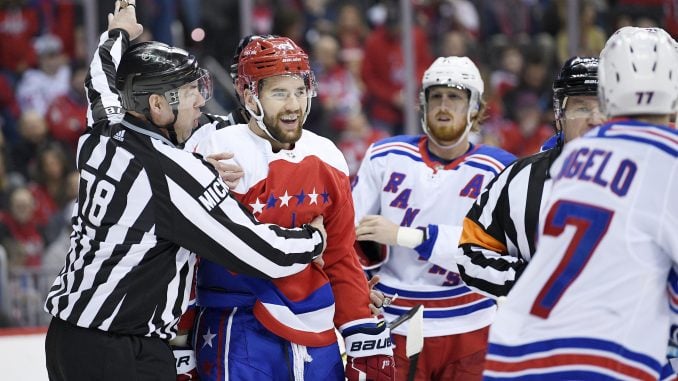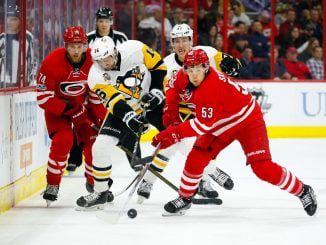
At the rink this past weekend, I overheard someone tell a player to “remember his number for next time,” a not-all-that-uncommon statement in the world of sports.
Despite the knowledge we as a society have about concussions, the fickle nature of sports and the finite careers of athletes, plenty of people are still out for blood if they feel they were wronged on the playing field.
The last two weeks in the NHL have offered plenty of examples.
San Jose’s Evander Kane let his never-ending rage toward the Vegas Golden Knights bubble over, getting thrown out of a Sept. 29 preseason game for abuse of an official and receiving a three-game suspension to start the season.
The Sharks, in turn, lost all three of those games — including consecutive outings to the Golden Knights — to start their season by allowing 12 goals while scoring just three.
Also losing their first three games were the Dallas Stars, who opened the 2019-20 campaign with a home loss to Boston followed by road losses in St. Louis and Detroit.
The most memorable moment from those three games? Bruins TV play-by-play man Jack Edwards again suffering from foot-in-mouth disease last Thursday with insensitive comments about injured Stars defensemen Roman Polak.
As Polak lay motionless on the ice after crashing head-first into the boards, Edwards opined that the play “has a little bit of bad hockey karma” — insinuating that the Stars defenseman deserved the injury, which ended up being a fractured sternum, because he was attempting to check a Bruins player in the corner.
Polak was on the ice for nearly five minutes and then stretchered off, but Edwards still doubled down the next day after being criticized by Polak’s agent, the equally outspoken Allan Walsh, by saying “I stand by my real-time call.”
The Carolina Hurricanes, meanwhile, opened their season with three straight wins, but not before the league’s revenge culture kicked in starting with the preseason finale at PNC Arena against the Washington Capitals.
The Capitals’ Tom Wilson, who has been suspended four times for a combined 23 games by the league for his dirty play, was given a 10-minute misconduct in the exhibition game after he and the Hurricanes’ bench engaged in a war of words.
The crux of the argument, it seems, centered on Wilson letting Carolina forward Warren Foegele know there would be payback for the latter’s hit on Washington winger T.J. Oshie during last year’s first-round playoff series. The hit wound up breaking Oshie’s collarbone and knocked him out for the balance of the Capitals’ seven-game loss to the Hurricanes.
Oshie, for his part, was also recorded this offseason answering a fan question about who he would choose if he had to fight anyone during the upcoming season. While not naming Foegele, Oshie said, “I’m sure a lot of people can probably guess, the way I went out with the season” and was followed by still images of Oshie injured on the ice with Foegele in the shot.
All that led Hurricanes coach Rod Brind’Amour — accused by Caps coach Todd Reirden of crossing a line for talking to Wilson from the bench during the preseason game — to address the brewing conflict ahead of Carolina’s second game of the season in Washington for the Capitals’ home opener, adding that he’d be happy to discuss the situation with Reirden.
Fortunately, cooler heads prevailed in the Hurricanes’ 3-2 overtime win in D.C.
Will Wilson and Oshie still be looking for Foegele’s No. 13 when the teams play three times in 17 days in late December/early January? Only time will tell.
As for the statement I overheard this past weekend, it didn’t come at PNC Arena or another NHL rink — it was following a 12U Pee Wee house league game in which my son had just played.
Upon hearing this from an adult talking to the preteen as they exited the rink, I turned and told him, “They’re kids.”
But I was wrong. This problem, the vigilante justice that pervades hockey culture, shouldn’t be kept to the pros. It’s wrong from the highest level of hockey down to the rinks where young players are just learning to love the game.
One lesson they don’t need? That retribution is part of hockey. And until the pros — the players, coaches and even announcers — set that example for kids and their parents, it will never go away.
Hopefully someone doesn’t have to be taken off the ice on a stretcher for that to sink in.



